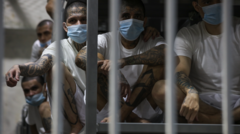In a bold move, El Salvador's President Nayib Bukele extended an offer to Venezuelan President Nicolás Maduro for a humanitarian agreement that would see the repatriation of 252 Venezuelan nationals deported from the United States, in exchange for the release of a corresponding number of Venezuelan political prisoners. Bukele's online appeal highlights a stark contrast between the criminal charges faced by the deportees and the political motivations behind the imprisonments in Venezuela.
El Salvador Proposes Prisoner Swap with Venezuela Amid Deportee Crisis

El Salvador Proposes Prisoner Swap with Venezuela Amid Deportee Crisis
El Salvador's President Bukele has suggested a controversial prisoner exchange involving deported Venezuelans and political prisoners held in Venezuela.
Bukele's overture comes as tensions rise over recent deportations, with claims that many among the deported individuals are linked to heinous crimes, while Venezuela's government maintains that there are no political prisoners. No official response has been received from Venezuela regarding the proposal.
In recent weeks, over 200 Venezuelan nationals, allegedly linked to the Tren de Aragua gang, have been sent back from the US to El Salvador. This situation has led to scrutiny over the Trump administration's hardline immigration policies, particularly their capability to detain and deport individuals without due process under the 1798 Alien Enemies Act. As the legal landscape shifts, the Supreme Court's recent decision to pause the deportation of a different group of alleged gang members underscores the ongoing contention surrounding these immigration practices.
This complex calculus of criminal justice and human rights illustrates the fraught relations between the countries and the delicate balance of power in dealing with issues of national security and humanitarian concerns.
In recent weeks, over 200 Venezuelan nationals, allegedly linked to the Tren de Aragua gang, have been sent back from the US to El Salvador. This situation has led to scrutiny over the Trump administration's hardline immigration policies, particularly their capability to detain and deport individuals without due process under the 1798 Alien Enemies Act. As the legal landscape shifts, the Supreme Court's recent decision to pause the deportation of a different group of alleged gang members underscores the ongoing contention surrounding these immigration practices.
This complex calculus of criminal justice and human rights illustrates the fraught relations between the countries and the delicate balance of power in dealing with issues of national security and humanitarian concerns.



















